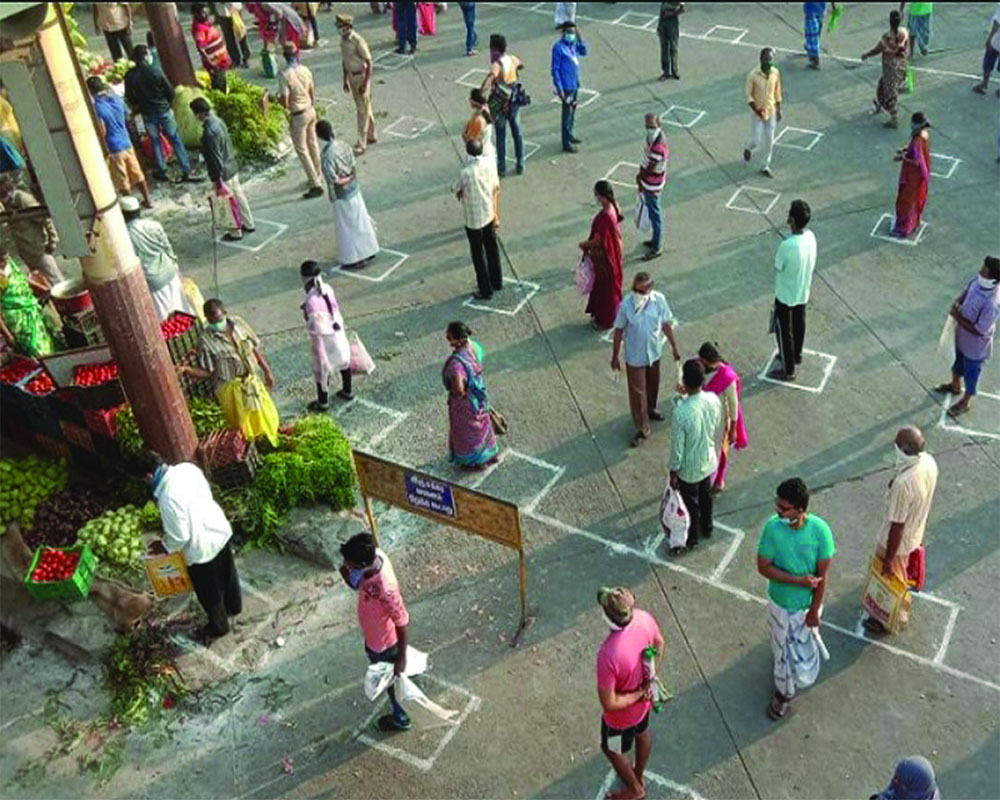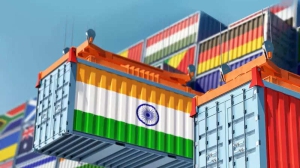Practices that are now seen as routine were brought about through our drastic behaviour change in the past to curb the spread of infection and even the plague
We need to start buildingour Covid capable world. The pervasive fear of a third wave exists as the second wave wanes. We have been here before; a merenine months have passed since the last 'unlock' that ushered in the calamitous second wave. Isthere a way to resume normalcy without unleashing the horror of a third wave?
It is now apparent that the coronavirus is here to stay. There is no miracle drug in thepipeline. Vaccination programs will take some time toface up to the twin challenges of a rapidly mutating virus and a large, susceptiblepopulation. Humanity, meanwhile, will have to get by.
Humankind has shown a remarkable tendency to survive despite adversity. Having neverbeen the strongest, the fastest, or the most immune, mankind has managed to win bysimply being the most adaptable. There is no innate resistance to the hardships of nature,just rapid adjustments through social, behavioural, and scientific engineering.
This is readily seen in our response to past epidemics. The bubonic plague, which causedthree deadly pandemics, was controlled through improvements in housing, sanitation, andhygiene. The disease was eliminated by rat-proofing homes, filling up holes in housesand adopting better food storage techniques. Drainage andsanitation were improved. City-wide quarantines were strictly enforced. Recordsof vinegar used as sanitizer range back to the 17th century.
A similar adaptation was seen in our response to HIV. Practices that are now seen asroutine were brought about through drastic behaviour change to curb the spread of theinfection. Universal testing of blood products in blood banks was started. Single-useneedles and syringes were brought into use. Universal precautions were introduced inhospitals to protect healthcare workers. Safe sex practices were encouraged. Despite thepervading stigma, testing in all expectant mothers was introduced to prevent mother-tochildtransmission. Awareness campaigns that explained how to break the chain oftransmission were instrumental in slowing the spread of HIV/AIDS. Four decades after the discovery of this virus, we are in the process of developing effective drugs to controland maybe one day 'cure' HIV. Meanwhile, society has learned how to exist with thedisease.
Combating the Covid-19 pandemic will require equal grit and commitment to behaviourchange. This is already apparent in healthcare settings, where all patients are being testedfor Covid-19 at admission. Healthcare workers are wearing masks and level 2 PPE innon-Covid wards as well. UV air purifiers and HEPA filters are being installed, andventilation in wards is being improved. Even in non-Covid wards, attempts are beingmade to keep beds at safe distances from each other, with the assumption that any ofthese 'test-negative' patients may turn out to be Covid positive any day. Droplet and aerosol precautions are being reinforced time and again, and online awareness coursesare being administered.
Similar changes are required in the community because, after all, Covid patients do notjust exist in hospitals. They come from the community. A strong response on all fronts -domestic, social, and occupational - is required to make our society capable offunctioning with the threat of the Covid infection.
Universal face masking, social distancing, and regular hand washing have alreadybecome the norm. However, to err is human, and so, these precautions are forgotten whenmeeting our loved ones. To ensure Covid - safety, meeting habits need to change. Largeparties held in closed rooms should give way to smaller gatherings under the starlight.Gatherings at the garden gazebo are back, family picnics are in, and we bid a sad farewellto kitties at the club.
In large societies and apartment buildings, elevators, staircases, and parking lots areinfection hubs. This needs to be reinforced with large signs reminding people to wearmasks in these potentially infectious sites. With time, these areas can be made betterventilated to reduce viral load. Similar caution needs to be exercised in commercialcomplexes and malls. Regulated entry of customers and 'sanitation gaps'every few hours may reduce overcrowding. Our shopping habits will have tochange. The local 'kirane wale bhaiya' is set to have a meteoric rise in importance ascommuting becomes limited due to infection risks.Tele-marketing has shown the way for tele-banking, tele-consulting, and tele-OPDs.
Metro and public transport have to be restarted, albeit in a limited capacity. Mandatorymasking, use of face shields, and hand sanitization may protect commuters. Railways and airlines will have todevelop sophisticated techniques for air management, which will result in an increasedcost of travel. International travel will be limited till vaccination rates increase.
Office work will change forever, as work from home becomes more and more acceptable. Intelligent automation and bots that targetreduction in mechanical effort will be put to use in reducing non-vital human contact.Work from home, however, will bring to the fore new societal challenges. Employers willhave to become more sensitive to the pressures people face at home. This will necessitate more flexibility in terms of timings and productivity measures.
Stereotyped gender roles will also be challenged as both husband and wife pitch in fordomestic chores, childcare, and the family's financial stability.
Education pedagogy is set to undergo a paradigm shift. Online teaching and digitallibraries will invite more flexibility in higher education - students can pick their owncourses, teachers, and timings. Field experience and laboratory-based learning will occuron campus, while assignments can be evaluated online. Learning management systemsand webcams will pave the way for online examinations. Blended online and offlinelearning will provide an avenue for the much-needed revamp of our education system.
Traditional amusements likeracing, skipping, Kho- Kho, and 'pithu garam' will be revived with strict attention torespiratory hygiene (regular hand washing, sneezing in the elbow and covering your facewhile coughing).
Religious festivals and fairs have been a subject of much controversy lately. They can bediscouraged but not abolished. Limited entry and social distancing will beinstrumental in improving safety on these occasions. Wisdom to avoid such events inplaces with active spread, and to postpone in the setting of subsequent waves, will haveto be exercised by our religious gurus and enforced by our regulatory authorities.Promoting Covid-appropriate behaviour by spiritual guides and local political leaders maygo a long way in making religious centers Covid-safe.
Rural-urban migration is a reality and an economic necessity. The pandemic hasdeepened social inequalities and worsened living conditions for the economically weakersections. State-led interventions providing safe and decongested housing facilities forrural labor in cities and slums will be vital in reviving developmental activities.
Elections are the backbone of our democracy. They cannot and should not be dispensedwith. However, they can be re-invented using the latest technology. Allotting time slotsfor EVM voting and increasing the number of polling centers can be done immediately. In the future, people can vote through their Aadhaar linked devices after identityverification at polling booths. Counting of votes can be done electronically with remotesupervision through CCTV cameras. At the same time, political parties need to commit tothe safety of their voters and use different means of conversing with voters. Social mediacampaigning is already in vogue. Political rallies need to be re-envisioned with deeperengagement in smaller groups while discouraging super-spreader events.
Monika is a 1989 batch IAS officer in UP. Prerna is a Resident, (Medicine), involved in COVID management at AIIMS, Delhi. The views expressed are personal.


























